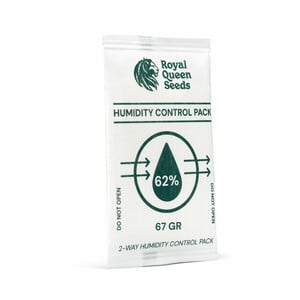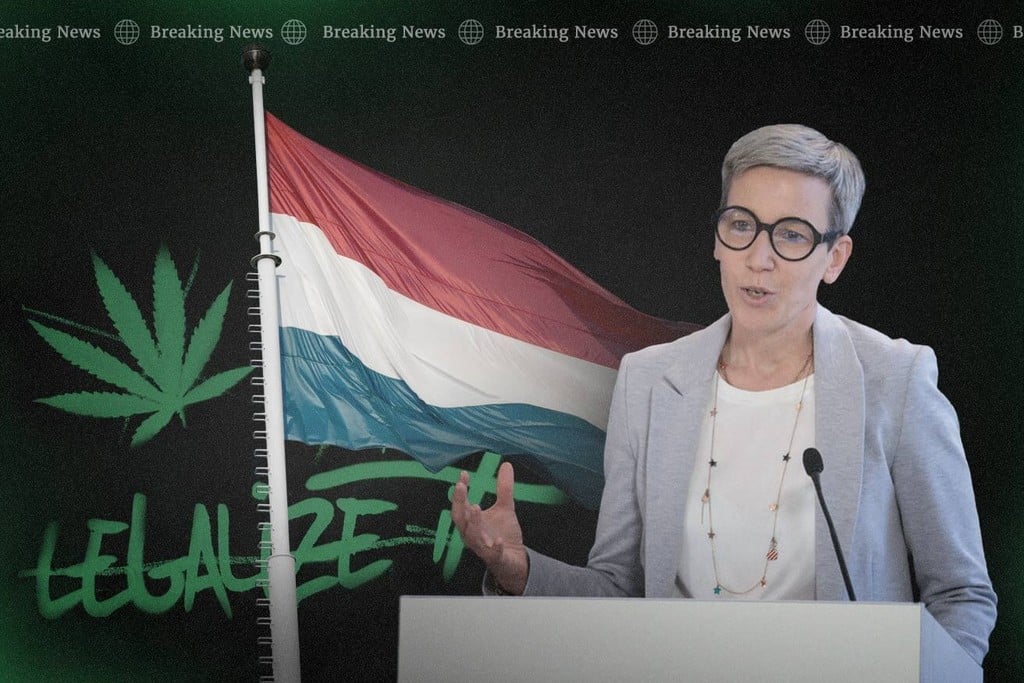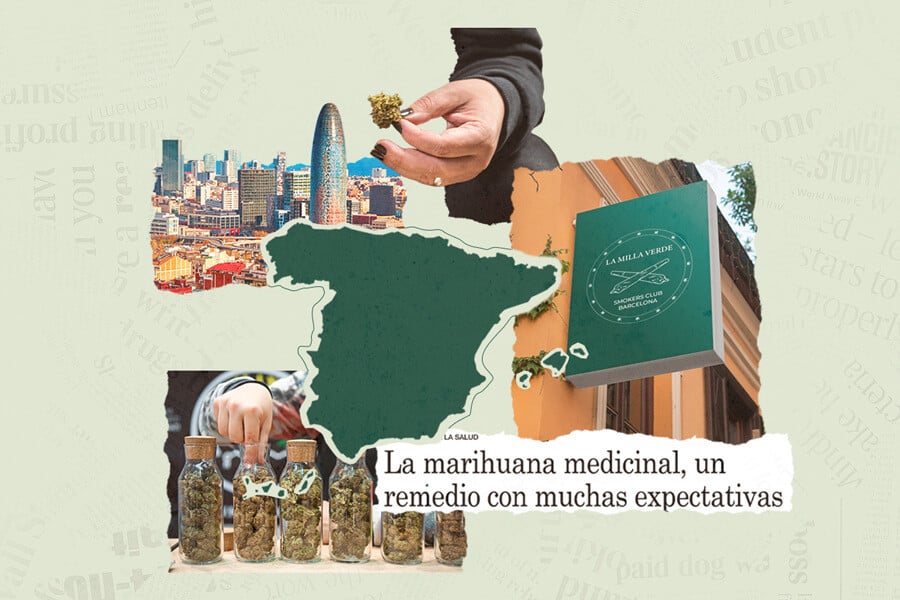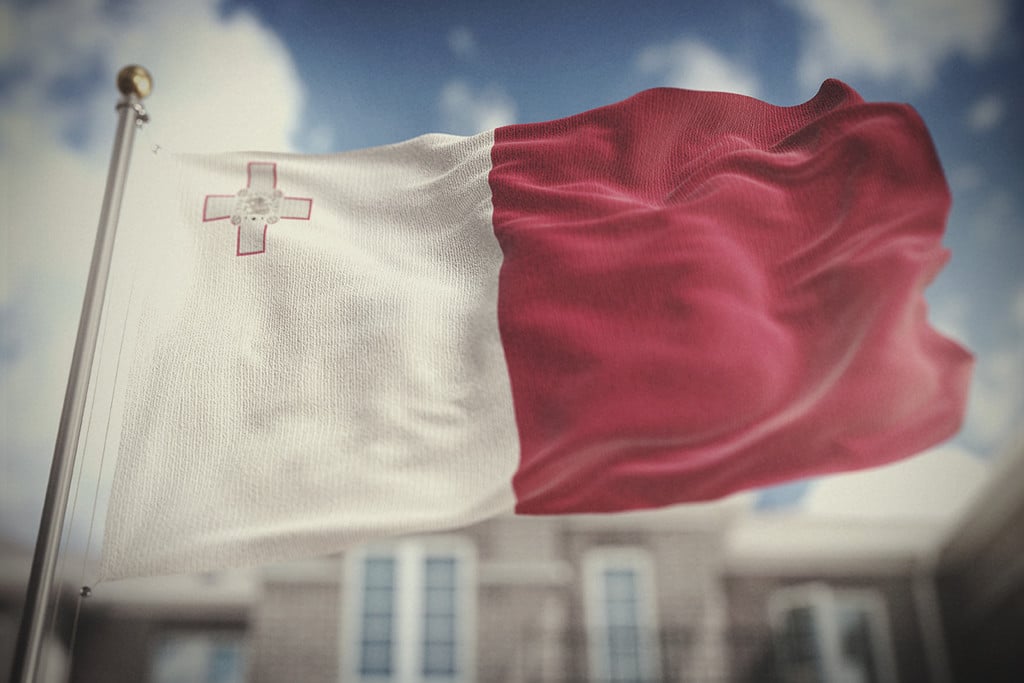.
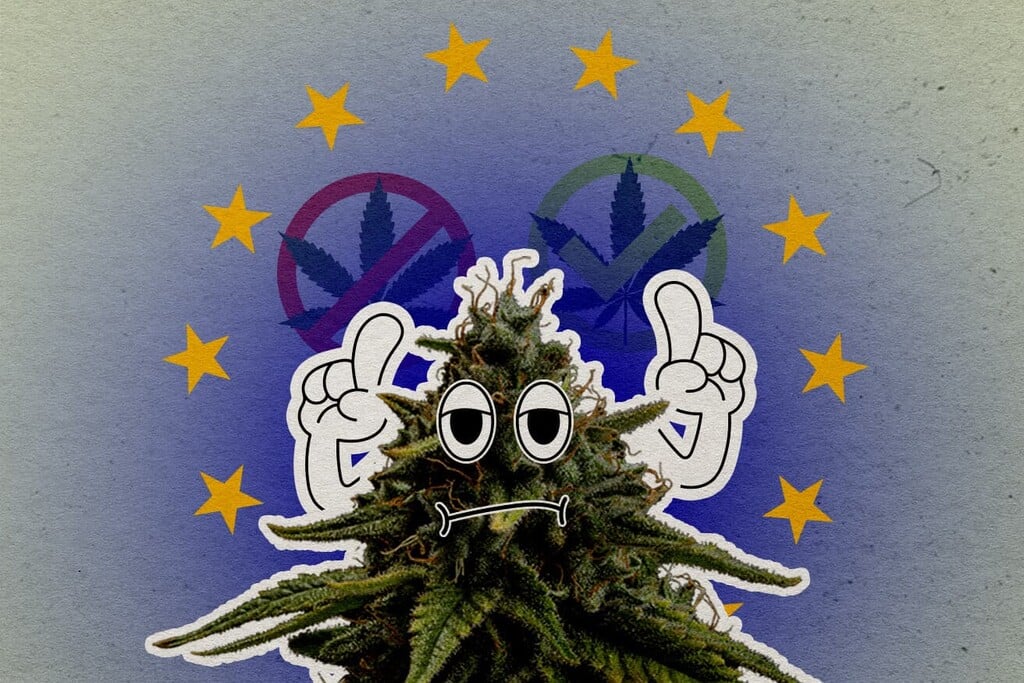
Where is weed legal in Europe?
Europe's cannabis laws range from full legalization to strict prohibition. This guide breaks down where weed is legal, decriminalized, or banned, helping you stay informed and safe, whether you're traveling or just curious. Discover where you can light up legally in this article.
Contents:
- European countries where weed is fully legal
- European countries that have decriminalised cannabis
- European countries where cannabis remains illegal
- Your guide to cannabis tourism in europe
- Cultural attitudes towards cannabis in europe
- The future of cannabis legalisation in europe
- Explore europe’s cannabis landscape in 2025
Europe’s cannabis laws are a maze, and one wrong turn can land you in serious trouble. Some European countries offer legal access to cannabis via clubs or stores; others don’t allow for the legal sale of weed but choose not to punish private use. On the other hand, some European nations still have strict no-tolerance policies in place, handing out fines or even jail time for possessing as little as a joint.
Whether you're a casual smoker or a full-blown stoner, this article tells you all you need to know about Europe’s cannabis laws. Find out where it’s legal, decriminalised, and harshly penalised, and learn more about the many gray zones to look out for.
European Countries Where Weed Is Fully Legal
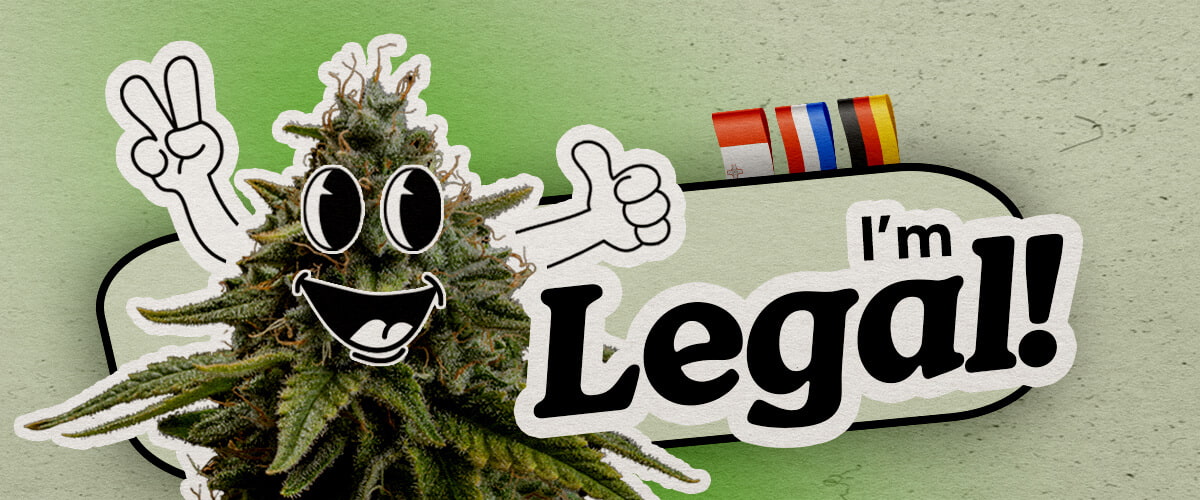
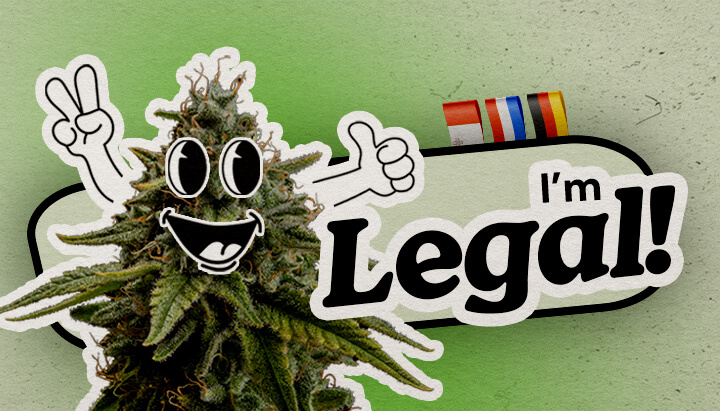
There’s a lot of misconception around what “legal weed” actually means, so let us clear the smoke. When a country legalises cannabis, it often reschedules the plant and stops treating it as a controlled substance, therefore removing penalties for its use, possession, or cultivation.
So far, only a few European countries have fully legalised cannabis for recreational use. At the time of writing this article, the European countries with legal weed are Malta, Luxembourg, and Germany. Below, we’ll take a look at what legalisation looks like in all of these regions.
Legal Weed in Malta
In December 2021, Malta became the first EU country to legalise recreational cannabis for adults aged 18 and over. Individuals may possess up to 7 g of cannabis in public and store up to 50 g at home. Private cultivation is also permitted, with each household allowed up to four plants (provided they are not visible from public spaces).
Meanwhile, the consumption of cannabis is only allowed in private residences. Public consumption can earn you a fine of at least €235 (or higher if there are minors around). Maltese residents can access cannabis for recreational use by either growing it themselves or through Cannabis Harm Reduction Associations (CHRAs); non-profit organizations that can cultivate and supply cannabis to their members.
Members can access 7 g of weed per day or a maximum of 50 g per month through these clubs. On-site use at these associations is prohibited, and a single association cannot have more than 500 members.
Legal Weed in Luxembourg
Luxembourg legalised the cultivation of cannabis for personal use in July 2023. Here, adults aged 18 and over may grow up to four plants at their residence. The plants must not be visible from public spaces, and a household cannot contain more than four plants.
Consumption is only allowed in private residences and must not occur in the presence of minors. Failure to comply with these rules can result in fines of up to €500. While tourists can possess cannabis, they cannot obtain it legally (since there is no way for them to buy it).
Legal Weed in Germany
Germany made headlines in April 2024 after its new cannabis laws came into effect. Under the new legislation, adults aged 18 and over can possess up to 25 g of weed in public and 50 g at home.
They can also cultivate up to three plants for personal use or buy cannabis from non-profit clubs restricted to a maximum of 500 members. Note that public consumption is allowed in Germany, but not within 100 metres of schools, kindergartens, playgrounds, or sports facilities. It also isn’t allowed in pedestrian areas between 7 AM–8 PM. While tourists can possess and consume cannabis legally, there is no way for them to legally obtain it.
What About the Netherlands?
Contrary to common belief, cannabis is not legal in the Netherlands; it’s still a scheduled substance under the Opium Act. However, the possession and sale of small amounts of cannabis are allowed under the Dutch “tolerance policy”. Under this policy, it's legal to possess and buy up to 5 g of cannabis via coffeeshops.
Consumption within these private venues is allowed as well, and some cities may tolerate public consumption too. Cultivating cannabis or possessing/selling large amounts of it, however, is still illegal and can result in fines or imprisonment.
European Countries That Have Decriminalised Cannabis
The decriminalisation of cannabis involves removing criminal penalties for certain offenses, usually minor possession. In regions where cannabis is decriminalised, the possession or use of cannabis may be tolerated or not persecuted by police. In other regions, carrying or consuming cannabis may result in a small fine, a warning, or simply the confiscation of the substance.
This differs from legalisation, where the use, possession, cultivation, and sale of cannabis are permitted under a regulated legal framework. Some of the countries that have implemented decriminalisation include:
Cannabis Laws in Portugal
Since 2001, Portugal has decriminalised the possession of all drugs, including cannabis. Individuals found with up to 25 g of cannabis flower or 5 g of hashish for personal use are not subject to criminal prosecution.
Instead, they may face administrative penalties such as fines or be referred to a Dissuasion Commission, which can recommend drug rehabilitation therapy or other measures. However, the cultivation, sale, and trafficking of cannabis remain criminal offenses under Portuguese law and can result in imprisonment.
Cannabis Decriminalisation in Spain
Again, there’s a common misconception that Spain has legalised cannabis, but this is not true; it has simply decriminalised personal consumption and cultivation. Currently, Spanish law allows adults (18 and over) to cultivate and possess cannabis in private.
Spain is also home to Cannabis Social Clubs (CSCs), which exist in a legal gray area but are generally tolerated if they:
- Are non-profit
- Only distribute cannabis to members
- Do not advertise
Tourists can join a CSC, usually for a small fee and using some kind of ID, then buy cannabis from the club and, given the club has a smoking area, consume it onsite. Note that this process is not legal but tolerated. Consuming or possessing cannabis in public, however, is considered an administrative offense and punishable by fines or confiscation. The sale and distribution of cannabis, however, can be seen as trafficking; a criminal offense punishable by jail time.
Weed in Czech Republic
The Czech Republic decriminalised the possession of small amounts of cannabis in 2010. Individuals (both residents and tourists) can possess up to 15 g of dried cannabis or cultivate up to five plants for personal use.
Exceeding these limits can lead to criminal charges, and consuming cannabis in public is also prohibited and punishable by fines. Selling cannabis, on the other hand, is still a criminal offense punishable by imprisonment. At the time of writing this article, there is no legal way to buy cannabis in the Czech Republic.
European Countries Where Cannabis Remains Illegal
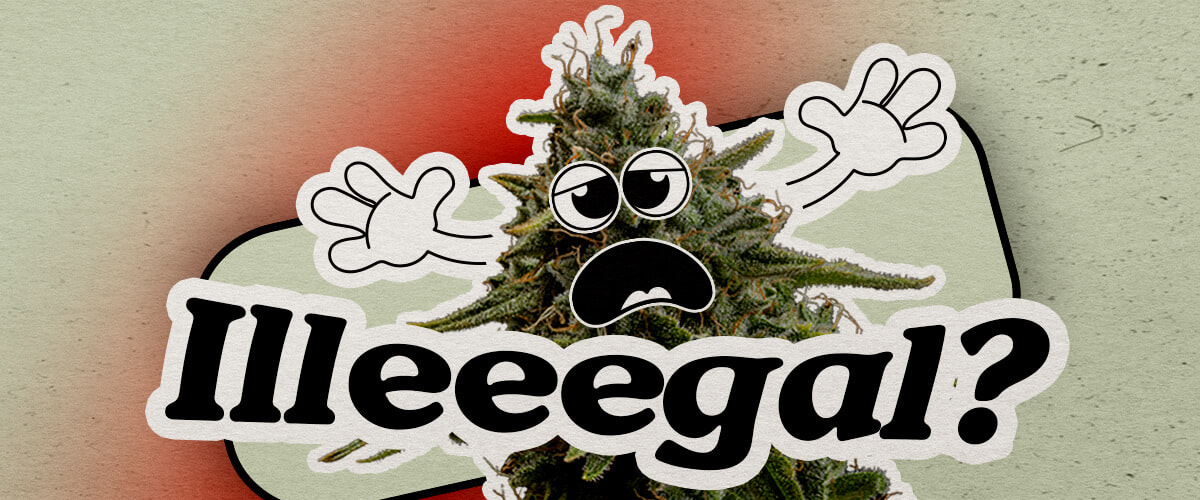
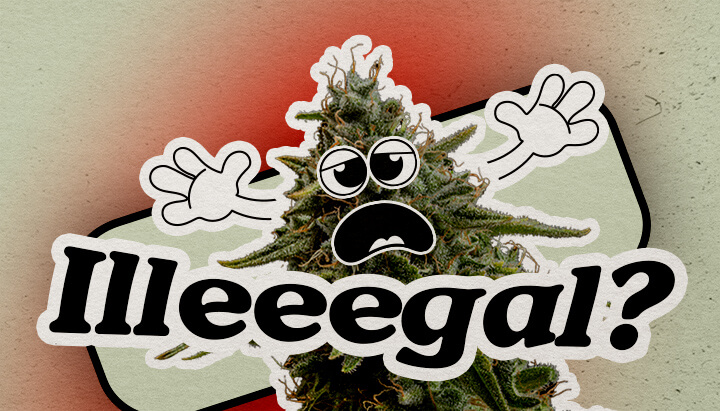
Cannabis remains completely illegal in many parts of Europe. In these countries, the possession, use, cultivation, and sale of weed (even in small amounts) are considered criminal offenses. Penalties can vary significantly between countries, ranging from fines to imprisonment. For example:
- France: Possession of small amounts can result in a fine of up to €3,750 and up to one year in prison. Notably, French law does not distinguish between possession for personal use and trafficking, leading to similar legal procedures for both offenses.
- Sweden: All forms of cannabis use, including medical, are highly restricted. Possession and consumption are criminal offenses, with penalties ranging from fines to imprisonment, reflecting the country's zero-tolerance stance.
- Hungary: Cannabis use remains strictly illegal. Possession, even in small amounts, can lead to imprisonment, with no distinction made between cannabis and other narcotics.
- Finland: Recreational cannabis use is prohibited, with possession punishable by fines or imprisonment. A limited medical cannabis programme exists, but access is tightly controlled and restricted to specific conditions.
Your Guide to Cannabis Tourism in Europe
Europe’s cannabis laws are as diverse as its languages. For travellers, that means the opportunity for a liberal weed vacation or legal nightmares. Whether you’re hitting up the beaches of Spain and Malta or heading to Amsterdam for a weekend of shopping and partying, understanding local European weed laws is key to staying safe and compliant.
Below, we’ll break down everything you need to know about cannabis tourism in Europe. We’ll point out the best places to access weed legally, how to store and use it responsibly, as well as general guidelines to ensure your vacation high doesn’t turn into a legal headache.
Accessing Cannabis Legally
Cannabis tourism in Europe is totally possible, but only in select destinations with semi- or fully legal systems designated to accommodate tourists. Here are your best bets for a European weed vacation:
The Netherlands: Tried and True Coffeeshop Culture
Amsterdam and other Dutch cities continue to offer the most tourist-friendly access to cannabis via their licensed coffeeshops. Here, anyone over 18 can purchase and consume up to five g of cannabis per day; no membership required. You’ll be able to choose from a variety of flower, concentrates, and edibles, which you can enjoy on-site or take with you to enjoy elsewhere.
Just remember, smoking cannabis in public is generally frowned upon and increasingly restricted. Lighting up in one of Amsterdam’s central districts, for example, can land you a €100 fine. Also, check with coffeeshops about their tobacco policies; some restrict the smoking of tobacco indoors.
Spain’s Cannabis Social Clubs: A Modern Alternative
Spain’s CSCs operate in a regulatory gray zone but are nonetheless a great option for travelling cannabis enthusiasts. To join one of these clubs, you’ll need to pay a fee and show some kind of ID. Then, you’ll be able to buy small amounts of weed and even light up on site.
Note that some clubs may require you to sign up in advance, so plan that in your itinerary to ensure you’re ready to enjoy yourself once you arrive. Remember, however, that smoking or possessing cannabis in public in Spain is a no-go.
A Note on Malta and Germany
Although cannabis is legal for adults in both Malta and Germany, these countries currently do not offer legal purchase options for tourists. Only Maltese residents can join Cannabis Associations (the sole legal distribution model), and commercial sales remain banned.
There is also no legal way for tourists to purchase cannabis in Germany. So, if you’re actively seeking out a weed vacation, these might not be the best destinations, even if they technically have legalised cannabis.
Safe Use and Storage
Cannabis may be legal or tolerated in parts of Europe, but using it responsibly is key to staying safe and respectful. Here are some tips to help you enjoy cannabis on your next Euro trip:
- Don’t fly with weed, ever. Even if both the departure and arrival countries have legalised cannabis, airports fall under international aviation laws, where possession can lead to arrest or fines. Always source your weed locally and leave it behind when you move on (or enjoy it all before you do!).
- When storing cannabis during your trip, use a smell-proof stash pouch to contain the aroma of your stash and hold other belongings like papers, a lighter, and a grinder. For extra points, toss in a humidity pack to keep your buds from drying out.
- Avoid travelling with cannabis in forms that aren’t clearly legal, such as edibles or concentrates. Many countries with relaxed laws on flower still ban these products outright.
- Avoid taking weed with you out in public unless you’re 100% sure that it’s legal to do so. Otherwise, save your stash at home and enjoy it in a cannabis-friendly private lodging (check out platforms like Bud and Breakfast to find yours!)
- Always keep your stash stored securely in private spaces, never in public or shared areas.
Staying Compliant as a Tourist
Even in countries with relaxed cannabis laws, compliance is everything, and ignorance isn’t a defense. Laws vary not just between countries, but between cities and regions, and they can change with little notice. Before lighting up, always check official government sources or reputable legal guides.
Don’t rely on hearsay, blogs, or Reddit threads. Instead, follow these basic tips to help you comply with European weed laws and avoid causing a nuisance to locals:
- Avoid public consumption outside of areas where it’s clearly permitted (such as the outside area of a coffeeshop, for example). Many places ban smoking in parks, near schools, or in busy areas. When travelling, play it safe and light up in private spaces or licensed venues like coffeeshops or cannabis clubs.
- Never, ever buy weed on the street, no matter how friendly the offer. Scams, fines, or worse (police stings) are common, especially in tourist hotspots. The same goes for platforms like Reddit, Telegram, Tinder, or Instagram. If it’s not legal and traceable, it’s not worth the risk.
Remember: getting high on vacation should be relaxing, not reckless. So, stay informed, be discreet, and, most importantly, respect local laws and customs.
Cultural Attitudes Towards Cannabis in Europe
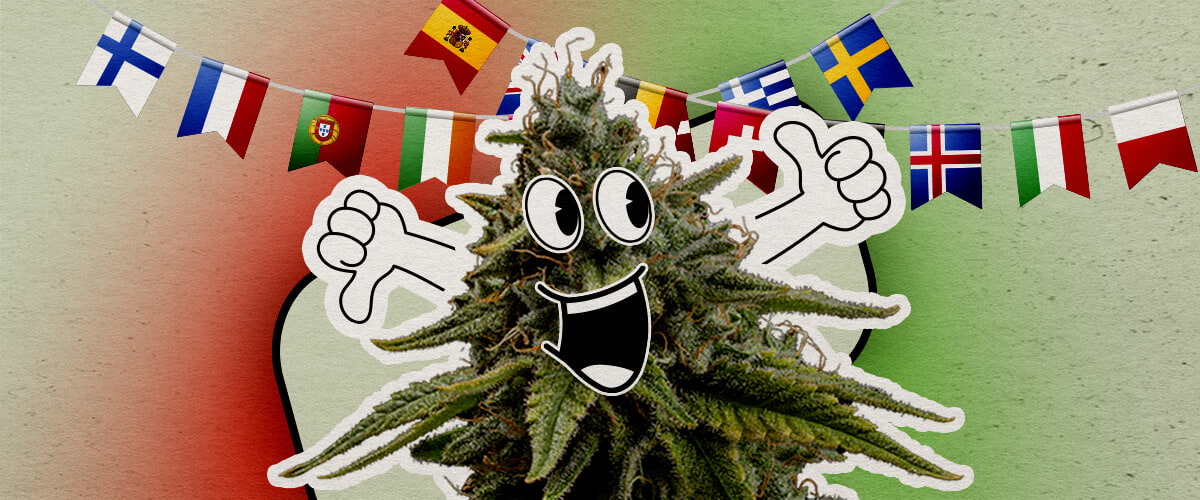
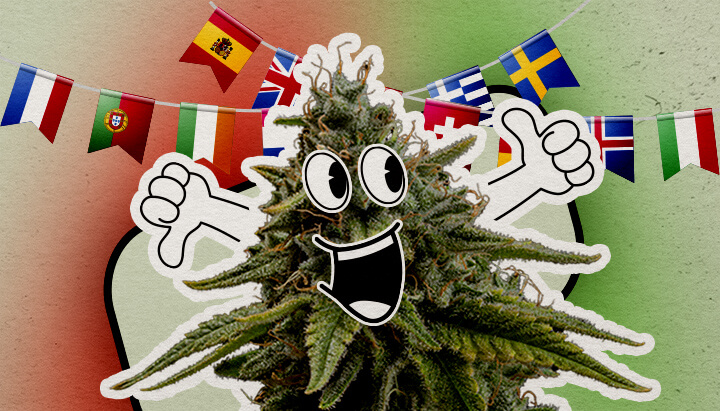
Cannabis culture in Europe is a complex mosaic, shaped by historical, social, and legal influences. Attitudes toward cannabis can vary significantly across the continent, from liberal acceptance to zero-tolerance prohibition.
Below, we’ll shine a light on some of the different attitudes towards cannabis you’ll find across Europe.
The Netherlands: Pragmatic Tolerance
The Netherlands has been renowned for its pragmatic approach to cannabis since implementing its “tolerance policy” in the 1970s. Aimed at separating soft and hard drug markets as well as reducing harm and criminality, the Dutch approach is far from perfect, but the system is fairly easy to navigate and, hence, a top pick for cannabis tourists.
Spain: Private Use and Social Clubs
Spain’s approach to regulating weed is unique in that it focuses mainly on promoting private consumption and cultivation. Unlike in Holland, where you can buy weed from a plethora of quaint coffeeshops bedazzled with paraphernalia and neon signs, Spain’s approach is much more low-key.
The rise of cannabis social clubs, especially in Catalonia, reflects a more communal approach to cannabis use. However, public consumption is often viewed as a nuisance and punished as such.
Portugal: Health-Centric Decriminalisation
Portugal decriminalised the possession of all drugs in 2001, shifting the focus from criminalisation to public health. Individuals found with small amounts of cannabis are referred to diversion commissions rather than facing criminal charges.
This approach emphasizes treatment and harm reduction over punishment. While cannabis remains illegal, the cultural attitude is more health-oriented, aiming to reduce stigma and promote rehabilitation.
France: Conservative Enforcement
France maintains a conservative stance on cannabis, with strict laws and enforcement. Possession and use are criminal offenses, and the country has one of the highest rates of cannabis consumption in Europe.
Despite public debates and some calls for reform, the government continues to prioritise prohibition, reflecting a cautious and traditional approach to drug policy.
Eastern Europe: Strict Prohibition
Eastern European countries like Poland, Hungary, and Slovakia all have stringent prohibition laws. Nonetheless, attitudes towards weed in Eastern Europe are undergoing some change; a 2023 survey[1] by the Polish Public Opinion Research Center (CBOS), for example, found that 73.4% of voters supported the decriminalisation of cannabis.
Scandinavia: Cautious Progressivism
Scandinavian countries exhibit cautious progressivism. While Sweden maintains strict prohibition, Denmark has initiated a medical cannabis pilot programme that will become permanent as of January 2026. It is also home to the anarchist commune Freetown Christiania, where the use and sale of cannabis was tolerated for over 50 years.
In Norway, cannabis remains illegal, but there is growing debate about drug policy reform in the country.
The Future of Cannabis Legalisation in Europe
Europe's cannabis landscape is undergoing significant transformation, with several countries exploring new regulatory models and pilot programmes to assess the implications of cannabis legalisation.
Ongoing Pilot Programmes & Potential Legal Shifts
- Switzerland: Since 2022, Switzerland has initiated pilot trials allowing a limited number of participants to legally purchase and consume cannabis under strict regulations. These studies aim to evaluate the effects of legal cannabis on public health and crime rates. While cannabis is illegal in Switzerland, its use is tolerated and rarely prosecuted by law enforcement.
- Czech Republic: The Czech Republic has announced plans to legalise cannabis for nonmedical use, focusing on home cultivation and regulated access.
EMCDDA's Role in Monitoring Legalisation Impact
The European Monitoring Center for Drugs and Drug Addiction (EMCDDA), now the European Union Drugs Agency (EUDA) as of July 2024, plays a pivotal role in monitoring and analyzing the impacts of cannabis legalisation across Europe. It achieves this goal through the following measures:
- Data Collection and Analysis: Provides comprehensive data on cannabis use, treatment demand, price, potency, and associated harms to inform policy decisions.
- Policy Guidance: Offers evidence-based recommendations to EU Member States on effective cannabis policies and practices.
- Monitoring Pilot Programmes: Assesses the outcomes of cannabis pilot programmes to understand their effects on public health and safety.
As Europe continues to navigate the complexities of cannabis legalisation, the EMCDDA/EUDA's role is to ensure that policy developments are grounded in robust scientific evidence and maximise public health.
Explore Europe’s Cannabis Landscape in 2025
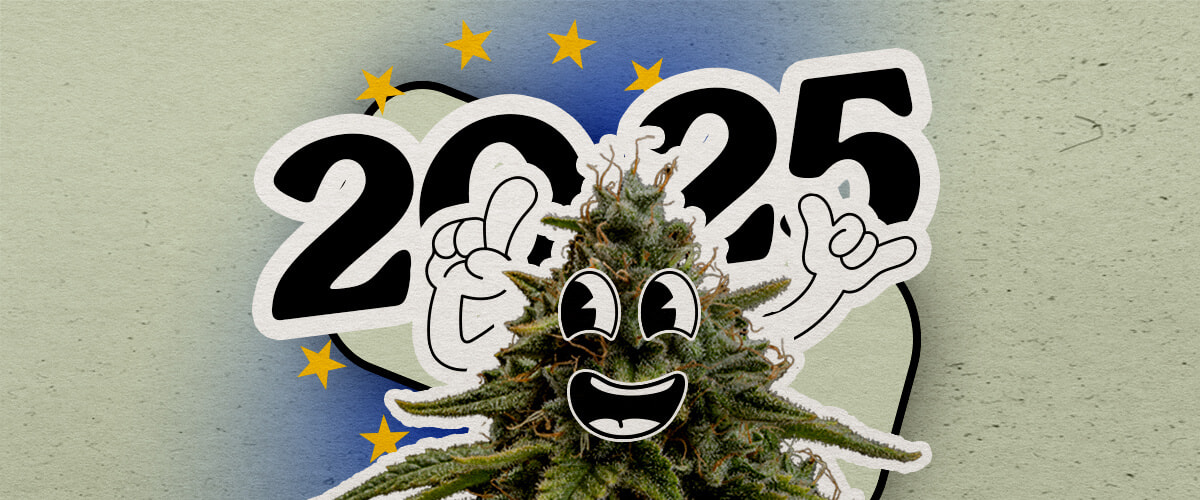
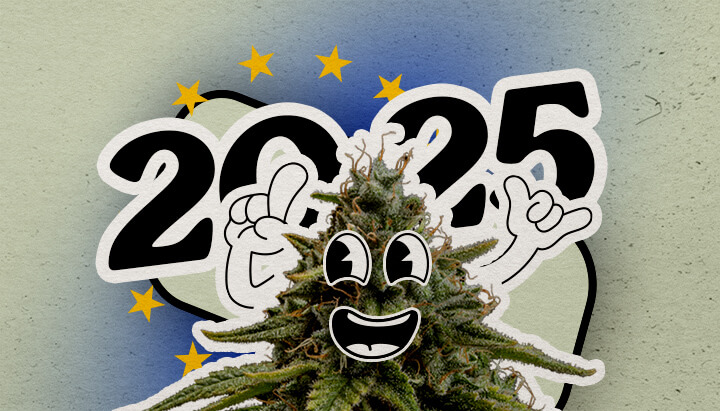
Europe’s cannabis laws are anything but uniform. From fully legal access in Malta, Germany, and Luxembourg, to tightly restricted environments like France, Sweden, or Hungary, the continent offers a patchwork of rules, risks, and opportunities for cannabis users.
This guide is designed to help you navigate that complexity, whether you're planning a cannabis-friendly vacation, curious about regional laws, or simply want to stay informed. With clear, country-specific insights, it’s your toolkit for safe, respectful, and responsible cannabis use across Europe.
As we move deeper into 2025, the legal landscape continues to evolve. Pilot programmes are underway, public attitudes are shifting, and reform is gaining traction. Change is coming, slowly, but steadily.


























